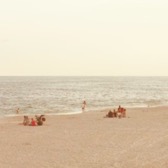
Reflections on Trevor Paglen’s photographs at The Photographer’s Gallery
Contribution to Cotton and Whitehead (2016) Thinkers in Residence, an Ebook for Thinking. The Photographers Gallery: London. see ebook
by Sally Weintrobe
I’m with Elizabeth Cotton at The Photographer’s Gallery looking at the photographs that won Trevor Paglen the prestigious Deutche-Borse photography prize in 2016. Elizabeth has invited my reflections.
Paglen’s photos are large and painterly. One is a stunning impressionistic picture of a Nevada sky at sunset reminiscent of Turner. In it is a tiny mark, a smudge so small that it looks like a minute insect or speck of dust. In fact it’s a drone. We only see the drone by looking very closely indeed. The end use of drones is killing people.
Paglen has said of this work, and his work in general: The idea is to try to create images that help us see the historical moment that we live in. … I mean that literally, not as a metaphor. … What I do is take an image that would be very familiar to somebody and suggest that it’s actually deeply unfamiliar. … We don’t think about the sky as being a landscape of war necessarily, in the traditional understanding of that image. … You have to go out of your way to see (that)”[i].
Paglen’s genius is in the way in which he engages our feelings of shock about the violence of drones. He does this not by taking a photograph that shows the violence, but by showing the drone as so tiny one does not notice it. We only see the violence when we shake ourselves out of familiar ways of seeing and familiar expectations and are willing to go out of our way to do this.
He insists his work is literal but I suggest it works as metaphor too, helping us understand what’s involved with the psychological mechanism of disavowal. Disavowal involves finding ways to ‘rid ourselves’ of those disturbing feelings that threaten to loom large when we face unpleasant or morally threatening realities. A common way disavowal works is to make what would disturb us seem to be tiny, insignificant or far away. Disavowal is magical thinking. One cannot get rid of reality by ‘resizing’ it; one cannot turn a large threat into a tiny one by ‘relocating’ it imaginatively so far away in our inner mental landscapes that it no longer has the power to touch us at a feeling level. In a state of disavowal we believes we have ‘dealt with’ a problem when all we have actually done is to make it seem insignificant. And, because we falsely believe we have now ‘dealt with’ the problem, the problem left unaddressed only grows.
A highly disturbing current reality is that our carbon intensive lifestyle is killing people. It has led to climate instability (increased hurricanes, floods and droughts) and it is already affecting food supplies. Unless we quickly move away from fossil fuels to renewable forms of energy, people and animals will die in vast numbers.
Our historical moment is that most of us are in deep disavowal about the violence and suffering our current carbon intensive way of living entail
My current work[ii] is on the way culture – through mass media, advertising, political framing and group culture – heavily promotes this disavowal. It relentlessly promotes the benefits fossil fuels bring and it relentlessly tells us we are exaggeratedly entitled to these benefits because we are special. It airbrushes out the violence and suffering they also bring. Seeing the violence would be deeply uncomfortable for most people and that would not be good for business as usual.
I suggest our culture encourages us to see a photo like this one (not by Paglen) as a plane in a beautiful sky at sunset jetting us away on holiday. Our culture works tirelessly to maintain this as the familiar view. We need to go out of our way, as Paglen put it, to see dead bodies as part of this picture.
The UK Government has just decided to build a third runway at Heathrow Airport. This will mean many vulnerable Londoners (children, the elderly and the infirm) will be killed each year by increased air pollution[iii]. The government is currently downplaying this stark reality. That tells us it does not care if Londoners live or die. They don’t see the consequences for real people in their idealized view of carbon based economic expansion. The pain of stepping out of disavowal and confronting this includes feel abandoned and uncared for. It also includes the anxiety of knowing leaders currently in power are in such a state of disavowal themselves they do not care if they and their families live or die (they live in London too).
To resist the siren-like cultural pull to disavowal is to shake ourselves out of emotionally comfortable but fake views; to allow ourselves to see the true scale of violence and suffering that lies behind an economy based on fossil fuels. Also, to see the true scale of uncare in a mindset that puts profit and unsustainable expansion ahead of life itself; that does not own this position as it has airbrushed the bodies out of the picture.
Climate change brings a growing number of refugees seeking food and shelter and fleeing wars exacerbated by conflict over resources[iv]. Tobias Zielony’s photographs of refugees in Europe were also on show at The Photographer’s Gallery[v]. I said to Elizabeth Cotton many people look horrified if one says the war in Syria was in part caused by drought brought about by climate change. They reject this outright whereas it is now a well-researched conclusion[vi]. Elizabeth in reply made the profound point that when we admit climate change leads to refugees the refugee story is no longer a story we tell about other people. It is a story that involves us all. To admit that brings emotional discomfort of a high order.
Elizabeth and I discussed ‘Noah’s Arcism’, the idea now gaining traction that ‘we’, the special entitled ones, will be able to protect ourselves as resources get scarcer by keeping others, including refugees, out. ‘Noah’s Arcism’ tends to go with demonizing the ‘pushed out’ ones as no good, feckless, wanting to invade us and so on. Noah’s Arcism also involves pushing out and abandoning the part of ourselves that cares and knows we need to lessen our expectations and live within the limits of planet earth. Leaving fossil fuels in the ground is a vital part of addressing the refugee problem.
We are incredulous when Donald Trump says, “I will build a wall”. We know it is an illusory way to keep out what disturbs people. But we build inner imaginary walls to keep out our pain at knowing our ‘carefree’ consumer lifestyles entail violence and suffering. We use inner surveillance to spot any felt pain so we can quickly insulate ourselves from it with fresh applications of disavowal.
Another of Paglen’s photographs provides a metaphor for the inner surveillance that goes on mostly beneath our conscious awareness to support the disavowal.
Hidden from this familiar view of an idealized idyllic summer holiday at the beach is an American NSA (National Security Agency) spy station monitoring the messages carried along the fibre optic cables that carry the world’s messages to and fro. The cables are under this beautiful stretch of coast.
Disavowal works by constantly surveying our inner feelings of disturbance about all the violence and suffering our historical moment entails. This monitoring of our disturbance is not to help us face the disturbance but to help us find corrupting psychological ways to fend it off.
[i] Personal conversation with Paglen.
[ii] See: www.sallyweintrobe.com
[iii] UK Government’s own figures show that air pollution is causing 50,000 early deaths a year. The UK has breached air quality standards since 2010. See Damian Carington High court rules UK government plans to tackle air pollution are illegal in The Guardian Wed 2nd November 2016.
[iv] For an analysis of how climate change inevitably leads to increased wars see Harald Welzer (2006) Climate Wars: Why people will be killed in the 21st Century. Polity Press: Cambridge.
[v] Zielony was also shortlisted for the Deutche-Borse 2016 photography prize.
[vi] See for example John Wendle’s article in Scientific American Dec 17th 2015 The Ominous Story of Syria’s Climate Refugees. It tells of how farmers who escaped the battle-torn nation explain how climate change led to drought which together with government abuse drove social violence
https://www.scientificamerican.com/article/ominous-story-of-syria-climate-refugees/

